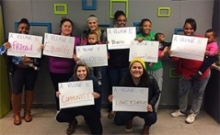Get to Know a Grantee: Waking the Village Encourages Young Mothers to Advocate for Justice and Achieve Career Success
Body
The Runaway and Homeless Youth (RHY) program understands that the mission of Maternity Group Home (MGH) grantees is to help young women “get busy living rather than surviving.” RHY Program Specialist Tim Joyce talked to Bridget Alexander, Executive Director and co-founder of Waking the Village (WTV) in Sacramento, California, to find out how her organization puts that message into action. Alexander, a former high school teacher, co-founded WTV about two decades ago.
WTV’s Tubman House program, which operates using MGH funding, houses up to eight mothers, ages 18 to 24, and their children. “We believe in the power of living in community,” says Alexander of its transitional living houses, noting that the alternative approach of housing youth independently without daily peer and staff interaction can create missed opportunities. “We’ve housed hundreds of youth and children and over 90 percent of them stay stably housed after they leave.”
WTV prizes staff retention and it often employs youth who have graduated from its programs. It also engages with clients from referral to independence and is a partner with Sacramento County’s Prevention and Intervention Program, which collaborates with other local youth services and housing providers. For young women who are still on the waiting list, the team conducts outreach efforts to ensure that they are referred to best-fit programs and remain engaged. WTV also receives RHY funding to operate a Transitional Living Program (TLP) that serves up to eight LGBTQ+ homeless youth.
In addition to its RHY funded programs, WTV operates an arts-focused youth drop-in center, a children’s arts center, three licensed preschools, and a youth employment program. To encourage youth-sustained independence, the program creates "traction toward a career and not just a job," says Alexander. All of these programs are woven together, and a young woman can be involved in all of them during her time at Tubman House. WTV children attend the preschools for free while they are at Tubman House and after their moms graduate from the program. WTV has recently opened Sacramento’s first emergency shelter for youth with children, which can house up to eight young mothers and their children. It also participates in the new federal Performance Partnerships Pilots program, which links youth who have completed TLP and MGH programs with housing choice vouchers through the local housing authority, provides case management for two years and support for housing retention, legal advocacy, and landlord interactions.
Alexander says that about half of the families WTV serves have experienced domestic violence. “The youth that we work with, universally, have been the inheritors of social injustice," she says. "They are where they are, not because of personal failure—they are where they are because of racism, classism, sexism, homophobia; they got the brunt of some of the historic nightmares that we’re starting to face as a nation.” The WTV team empowers youth to lift the burden of self-blame and acknowledge their trauma. “The most common wellness concern is the impact of trauma, depression, and anxiety, all of which were harvested from their life experiences," says Alexander.
The COVID-19 pandemic introduced new challenges, including youth needing to leave Tubman House to look after family members struggling with health issues. Tubman House also saw huge impacts from requiring youth to be tested for COVID-19 before admission. Unfortunately, the time spent waiting for a negative test result could be long enough for a youth to back out of entering the program and return to an unhealthy relationship.
WTV sees many young women work through barriers. “Youth who have a child, even when they’re homeless, are ready to take big steps; we just have to be there," says Alexander. "They’re determined, they’re hope-filled, they have a renewed determination to sharpen their future into something beautiful and meaningful. They want to have a meaningful career and they’re ready to work for it.” Many Tubman House youth serve on Sacramento’s Youth Council and a WTV graduate sits on the city’s Continuum of Care (CoC) Board.
Alexander has an in-depth understanding of this population—and is concerned about society’s view of them. “Our youth are loving and energetic parents; they’re funny, full of life and striving for a healthy interdependence," she says. "Our young women reflect their generation and resiliency.” She emphasizes that ending youth homelessness requires cultivating relationships and supportive networks and taking time building youth up to become leaders. Ultimately, as the name of Waking the Village suggests, everybody is in position to help youth in their community. “If everybody just did that, I wouldn’t have 100 people on my waitlist," she says. "If you get enough support in there and enough love in there, you really can see transformations.”
Learn more about Waking the Village and Maternity Group Homes:
Waking the Village (website)
Tubman House (website)
Waking the Village and Tubman Village (Facebook)
Maternity Group Homes (MGH)
